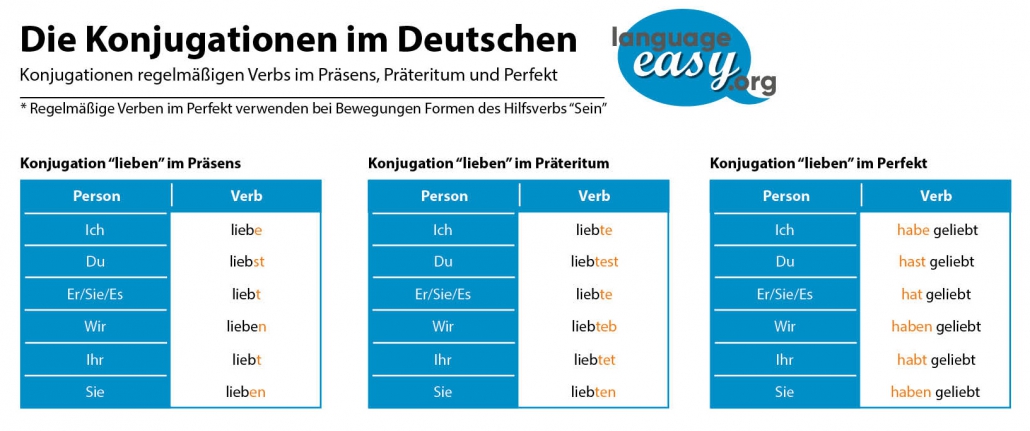German Verbs
Verben im Deutschen – Erklärungen und Beispiele
German Verbs – Summary
Zusammenfassung
Verbs normally build the predicate of a sentence. They stand for processes, conditions and actions. There are five factors that influence the form of a verb: person, number, its active or passive form, its mode (Modus) and its time (Tempus).
1. Person: There are forms of the first, second and third person, of singular and plural.
2. Number: There are singular and plural forms.
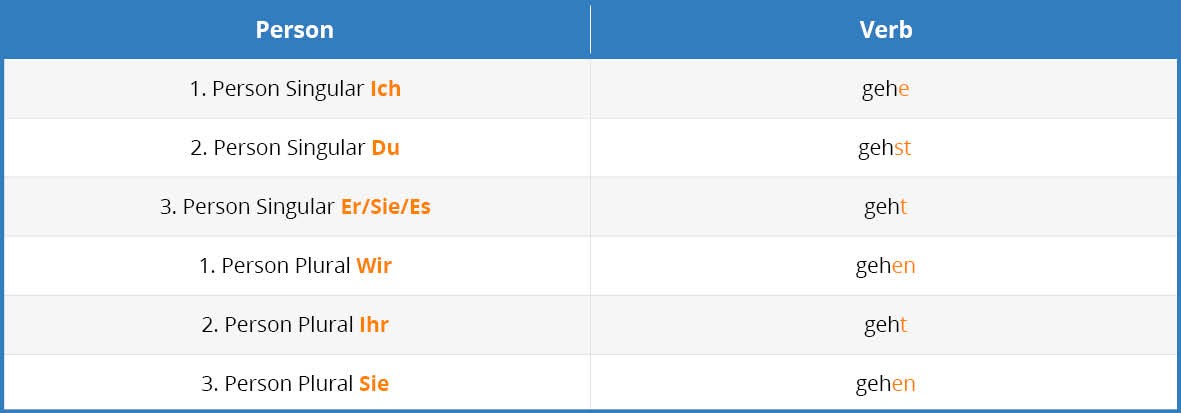
3. Active or passive
- Aktive: “Ich liebe dich.”
- Passive: “Du wirst von mir geliebt.”
4. Mode (Modus)
- Indicative (Indikativ): “Du spielst mit mir.”
- Subjunctive (Konjunktiv): “Du könntest mit mir spielen.”
- Imperative (Imperativ): “Spiel mit mir!”
- Interrogative (Interrogativ): “Spielst du mit mir?”
5. Time (Tempus)
There are basically three types of time:
- Present
- Past
- Future
And there are several types of past and future tenses.
- Past: Präteritum (Past tense), Plusquamperfekt (Past perfect) and Perfekt (Present perfect)
- Future: Future 1 and Future 2
Learning German verbs can be a really sad experience.
Well, let’s be honest, learning German in general can be hard! A lot of German learners who come to Germany without any basics of this language, have difficulties to get into it. Especially when the only help you’ve got is a German dictionary.
Luckily, you have taken the right step and visited this website on language-easy.org! Here, we will try to get into one of the rather confusing parts of German grammar when you start learning this language: The conjugation of German verbs.
Actually, it can be quite easy when you get a good instruction right ahead. German verbs can be divided into two groups:
- Strong verbs
- Weak verbs
Depending on what kind of verb you have, its conjugation changes. Logically, it is far easier to conjugate when you know the difference between these two kinds.
I hope you will get these basic principles of conjugation of German verbs at the end of this article and become an expert in it!
The different Types of German Verbs on Language-easy.org
By the way, this article is just a general overview about German verbs. Of course, there are also articles about the different kinds of German verbs in this context. So, in the following I’d like to show you the links to different topics and a short description of the topic.
The Difference between Strong and Weak German Verbs
Der Unterschied zwischen starken und schwachen Verben im Deutschen
First of all, let’s specify the different kinds of German verbs. I already told you that there are strong verbs and weak verbs. But there is another important group: The mixed verbs.
Basics of Weak and Strong Verbs
An important fact you have to know is that most of the German verbs are weak verbs. But there is also a rather small part of German verbs that consists of strong verbs! Many of these strong verbs are quite important and frequently used in every-day language. Also, they are often irregular when conjugated – not in every tense they have, but still quite frequently.
Take care of learning strong verbs quite well. As they appear a lot in conversation, they can really be confusing with their changes in spelling due to their irregular conjugation.
Don’t worry too much when you make mistakes in conjugating German verbs. German speakers will understand you anyway. But if your personal goal is learning this language perfectly, you don’t get around this important part of German grammar.
By the way, did you know who first mentioned the division of verbs into strong verbs and weak verbs? It was Jacob Grimm! Maybe you have heard of him and his brother Wilhelm: The brothers Grimm! Jacob was a well known philologist in his times and, apart from Grimms Märchen, he wrote a lot of important works about the German language and its grammar.
Basics of Mixed Verbs
So, mixed verbs are, as you already thought, for sure, a mix of weak and strong verbs. Let’s just go into details, as we will focus more on the other two groups of German verbs later on.
Mixed verbs have a change in spelling in the past tense with normal verb endings. Here is an example with the verb “brennen” (to burn) in the third person singular in different tenses:
- “brennt”
- “brannte”
- “hat gebrannt”
Finally, we have learned some basics of the three types of German verbs. Let’s go right ahead into some details:
The Conjugation of Weak Verbs
Die Konjugation schwacher Verben
Conjugation of Weak Verbs in “Präsens”
So, we have come to the first, and maybe most important part of the conjugation of German verbs: the conjugation of weak verbs in “Präsens” (present tense). Its importance comes from the fact that it is completely regular and covering most of German verbs. So, once you are good at this easy conjugation, you already master a great of German verb conjugation.
Let’s start right ahead with the weak German verb “kaufen” (to buy) in its present tense forms:
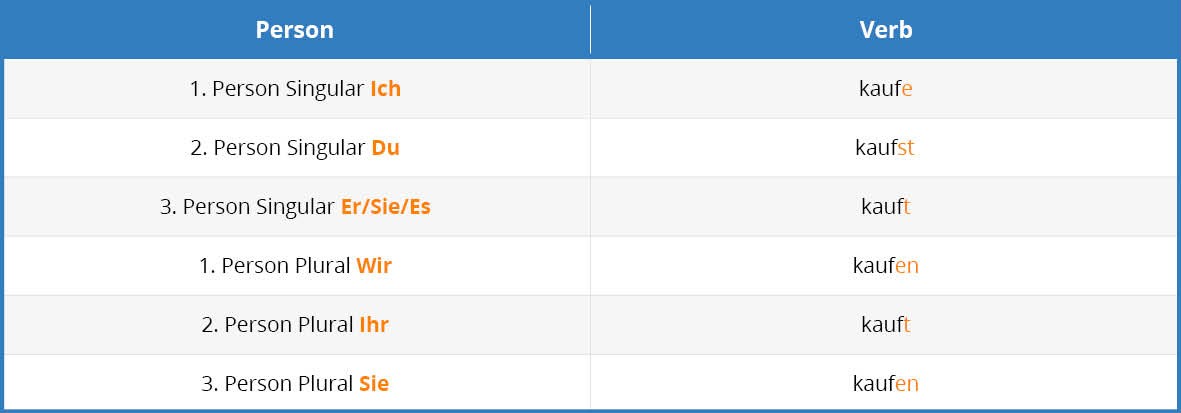
Please, note: German verbs, when conjugated, consist of two parts. The stem of the verb and its ending. In this case, “kauf” would be the stem of the German verb and, well, the endings you can see in our table above.
So, I already explained to you the importance of learning this conjugation very well, as it occurs quite often. It wasn’t that difficult until now, right? So, let’s go to our next tense, the “Präteritum”.
Conjugation of Weak Verbs in “Präteritum”
Well, in the “Präteritum” (past tense), conjugation of weak German verbs is actually quite similar to the conjugation of verbs in present tense. Please, note that the past tense forms are also quite important as they are normally used in written texts.
Luckily, there are only small differences between the conjunction in Präsens and Präteritum: The third person singular differs and there is a “t” at the beginning of all verb endings. So, let’s look at an example with our weak verb “kaufen” in past tense conjugation:
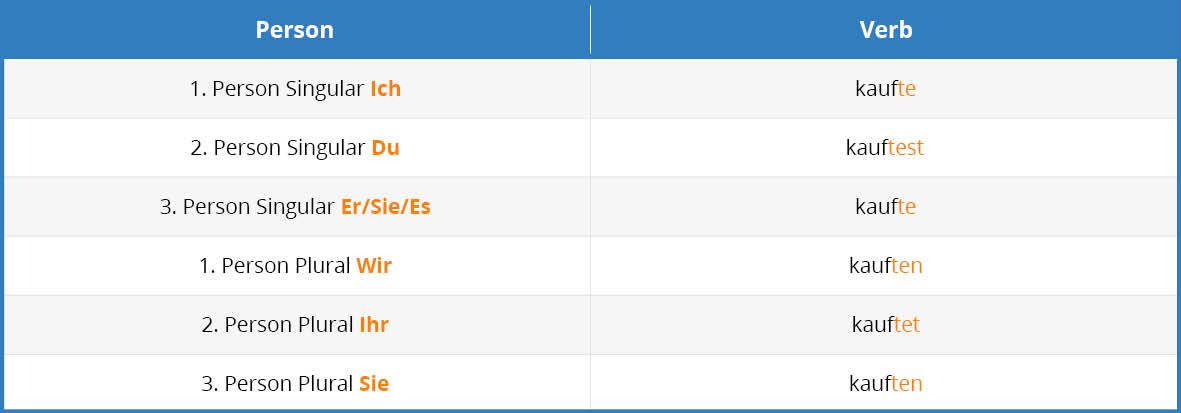
Well, as it is really quite easy to master these conjugations, let’s come to the last tense, the “Perfekt”.
Conjugation of Weak Verbs in “Perfekt”
So, in comparison to “Präteritum”, “Perfect” (perfect tense) is mostly used in every-day spoken German language. It is interesting comparing German to English in this case: whereas Präteritum and Perfekt are actually equal in use in German, in English, these two tenses can’t be used equally.
Well, the conjugation of a weak German verb in Perfekt is actually one of the simplest conjugations. Nevertheless, it can help you a lot learning the conjugation of auxiliary verbs “haben” (to have) and “sein” (to be). So, let’s use our dear verb “kaufen” again:
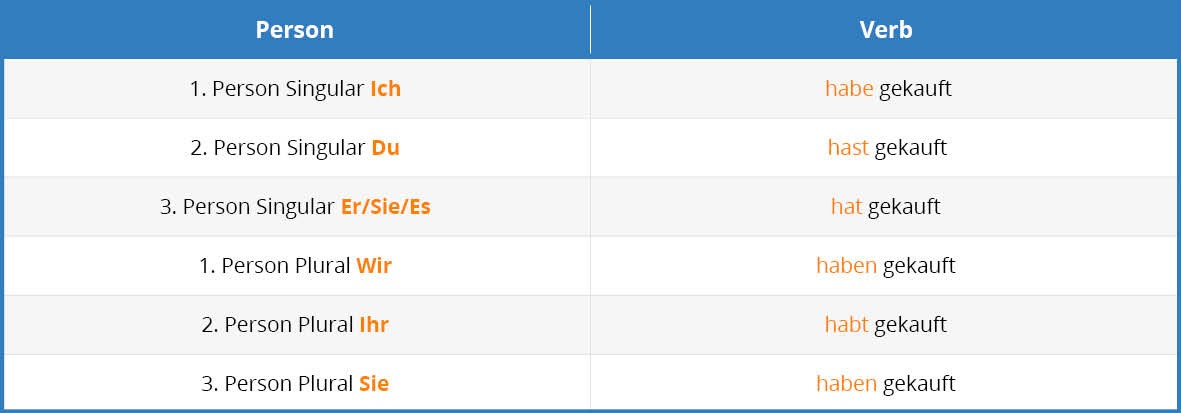
Obviously, you just have to use the stem of the verb, in this case it is “kauf”. Then you add “ge-“ at the beginning of this German verb. Finally, you use the right ending of the verb and it is done!
The Conjugation of Strong Verbs
Die Konjugation starker Verben
Well, I just hope that you are seated. And having a cup of coffee in front of you isn’t a bad idea, either. You really have to be strong now… We are going to talk about the conjugation of strong German verbs!
And here are some bad news right at the beginning: The most effective way of mastering strong German verbs is practice. There are some rules you have to follow, but actually there are a lot of exceptions.
The Conjugation of Strong Verbs in Präsens
So, in this case we have irregular verbs. Luckily, there are only vowel changes in the second and third person singular, which can be categorized in the following three kinds:
- “e” to “i” — ex: “geben” (to give) to “du gibst” (you give)
- “e” to “ie” — ex: “lesen” (to read) and er “liest” (he reads)
- “a” to “ä” — ex: “fahren” (to drive) and “er fährt” (he drives)
Actually, you can apply these three types to nearly all conjugations of strong German verbs in the present tense.
The Conjugation of Strong Verbs in Präteritum
Things become a little more difficult when talking about conjugations of strong German verbs in past tense. Nevertheless, there are some rules you can follow:
- Long “e” and “i” sounds change to “o” — ex: “bewegen” (to move) becomes “bewog”.
- Short “e” and “i” sounds change to “a” — ex: “essen” (to eat) becomes “aß”.
- Many verbs with “ei” change to either “ie” or “i” — ex: “schneiden” (to cut) becomes “schnitt”.
- Verbs with an “ä” vowel change in the present tense change to either “ie/i” or “u” — ex: “laufen” (to walk or walk fast) becomes “lief” and “fahren” (to drive or go) becomes “fuhr”.
The Conjugation of Strong Verbs in Perfekt
Finally, we have reached the ‘crème de la crème’ of complicated conjunctions of strong German verbs: The conjugation in Perfekt!
But don’t panic now. Here are some rules that can help you to see some light at the end of the tunnel:
- Some verbs with “ei” change to either “ie” or “i” — ex: “beißen” (to bite) becomes “gebissen”.
- In many cases, verbs with “ie” change to “o” — ex: “fliegen” (to fly) becomes “geflogen”.
- A lot of verbs with “i” infinitive change to “u” — ex: “springen” (to jump) becomes “gesprungen”.
- Many verbs with “e” typically change to “o” — ex: “sterben” (to die) becomes “gestorben”.
As already mentioned, there are exceptions all over in conjugation. Probably you won’t be able to avoid studying hard of German verb conjugation. Nevertheless, I hope that the tricks and examples could help you to clear up at least some parts of the conjugation of German verbs!

